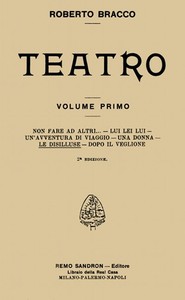| Author |
Bracco, Roberto, 1861-1943 |
| Title |
Le disilluse
|
| Note |
Reading ease score: 61.1 (8th & 9th grade). Neither easy nor difficult to read.
|
| Credits |
Produced by Carlo Traverso, Claudio Paganelli, Barbara Magni, and the Online Distributed Proofreading Team at http://www.pgdp.net
|
| Summary |
"Le disilluse" by Roberto Bracco is a one-act marionette play written during the late 19th century. The work explores themes of love, disillusionment, and social dynamics among young women who have fled their lives in search of fulfillment. Through a blend of fantasy and social commentary, Bracco crafts a whimsical narrative that reflects the attitudes and expectations of women in society during this time. In "Le disilluse," the story unfolds around a group of disillusioned young women who have escaped their former lives in the kingdom of Zano. They reside in a fantastical castle where they lament their lost hopes and dreams, believing they have found solace away from the male-dominated world. However, their lives take a turn when Arunto, a determined young man, sets out on a quest to retrieve them for the kingdom. Disguised as an old man, he cleverly convinces the women that he possesses a magical means to conjure love and desire. Through a series of events, including the distribution of portraits of noble men that spring to life, Arunto helps the disillusioned girls find love and return to their home, as they navigate their complex feelings towards love, marriage, and their roles in society. Ultimately, the story captures the transformation of disillusionment into hope and the realization that true happiness might lie in facing their fears of love and commitment. (This is an automatically generated summary.)
|
| Language |
Italian |
| LoC Class |
PQ: Language and Literatures: Romance literatures: French, Italian, Spanish, Portuguese
|
| Subject |
Italian drama
|
| Category |
Text |
| EBook-No. |
37932 |
| Release Date |
Nov 5, 2011 |
| Copyright Status |
Public domain in the USA. |
| Downloads |
84 downloads in the last 30 days. |
|
Project Gutenberg eBooks are always free!
|

